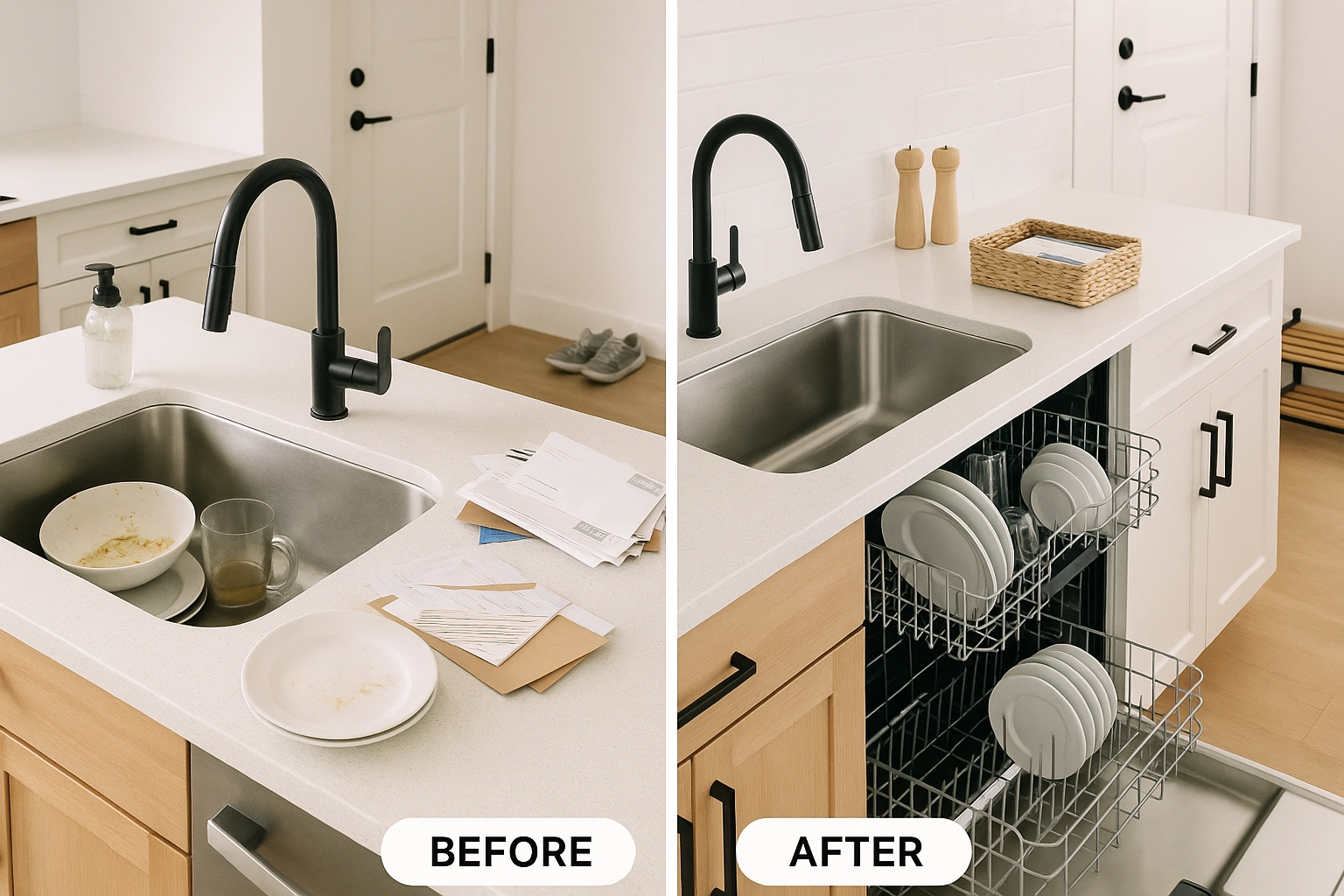
We've all been there, haven't we? Standing in the kitchen at 7 AM, coffee mug in one hand, trying to remember if you packed lunch while simultaneously wondering where your toddler put their favorite stuffed animal, and oh wait, did you schedule that doctor's appointment? If this sounds like your typical morning, you're definitely not alone!
The truth is, feeling overwhelmed as a busy mom isn't a character flaw or a sign that you're not cut out for this. It's simply what happens when we try to juggle a million things without the right systems in place. But here's the good news: with just a few strategic planning tweaks, you can transform those chaotic mornings into something much more manageable.
Let's dive into five game-changing planning hacks that will help you reclaim your sanity and actually enjoy your days again!
1. Master the Art of Block Scheduling
Think of block scheduling as creating appointment slots for your life: except instead of booking meetings, you're booking time for the things that actually matter to you and your family.
Here's how it works: instead of trying to squeeze laundry, meal prep, and work calls into random moments throughout your day, you assign specific time blocks to each category of activity. It's like giving every important task its own dedicated parking spot!

Start small with daily blocks. Maybe your first hour is for tackling emails and urgent communications, followed by a solid two-hour block for household tasks. But here's where it gets really powerful: you can also create weekly blocks where certain days become dedicated to specific recurring tasks.
Picture this: Friday becomes your meal planning and grocery shopping day. No more Sunday night panic about what to cook for the week! Wednesday is your errand day: pharmacy, dry cleaning, that return you've been putting off for weeks. Sunday afternoon? That's laundry folding and organizing time.
The beauty of this system is that it eliminates what I like to call "decision fatigue." You know, that exhausting feeling of constantly having to decide what to do next. When Friday rolls around, your brain doesn't have to waste energy wondering when you'll fit in meal planning: it's already scheduled!
2. Create Your Weekly Planning Power Hour
This three-part weekly routine might just be the secret weapon you've been looking for. It sounds like a lot at first, but trust me: investing this time upfront will save you hours of stress and confusion throughout the week.
Sunday Night Family Huddle (20 minutes)
Gather everyone around the kitchen table (or wherever works best) and review the upcoming week together. Who has soccer practice? When is that work presentation? Who's handling school pickup on Tuesday? This isn't about creating a rigid schedule: it's about getting everyone on the same page so nobody's caught off guard.
Monday Morning Deep Dive (60 minutes)
I know, I know: an hour sounds like a lot when you're already stretched thin. But here's what makes this worth it: you're going to map out your entire week with crystal clarity. Choose three priorities for each day: maybe three work-related and three personal ones. Having this roadmap means you'll spend way less time throughout the week wondering what you should be doing.

Thursday Morning Reset (30 minutes)
Think of this as your mid-week check-in. Review what you've accomplished, check off completed tasks, and make any necessary adjustments for the rest of the week. Did something unexpected come up? No problem: adjust your Friday priorities accordingly.
This routine creates a predictable rhythm that helps prevent that scattered, "where-did-my-week-go" feeling we all know too well.
3. Embrace the Magical Two-Minute Rule
This one's a total game-changer, and it's so simple you might roll your eyes at first. But stick with me!
The two-minute rule is basically this: if something takes two minutes or less to complete, do it immediately instead of adding it to your ever-growing to-do list.
Think about it: how much mental energy do you spend carrying around thoughts like "I need to wipe down that counter" or "I should put those shoes away"? These tiny tasks might seem insignificant, but they add up to create a constant background buzz of things you "need to do."
Here are some perfect two-minute tasks:
- Wiping down the bathroom counter after getting ready
- Putting dishes directly into the dishwasher instead of leaving them in the sink
- Hanging up jackets instead of draping them over chairs
- Switching laundry from washer to dryer
- Responding to quick text messages
The magic happens when you realize you're maintaining a tidier, more organized environment throughout the day without dedicating huge chunks of time to cleaning. Plus, you're freeing up valuable mental space by not carrying these little tasks around in your head!
4. Set Goals That Actually Make Sense
Let's talk about goal-setting for a minute: but not the overwhelming kind where you write down seventeen things you want to accomplish before noon. I'm talking about smart, realistic daily goals that set you up for success rather than disappointment.

The key here is focusing on what truly matters instead of trying to do everything at once. Maybe your goals for today are: finish that work project, prep tomorrow's lunches, and have a conversation with your teenager about their upcoming school trip. That's it. Three solid, achievable goals that move the needle forward.
Writing these goals down is crucial: there's something powerful about seeing them on paper (or in your favorite planning app). And don't underestimate the satisfaction of checking them off! As busy moms, we accomplish so much every single day, but we rarely give ourselves credit for it. These daily goals become visible proof of your productivity and progress.
Remember, celebrating the "small" wins isn't silly: it's necessary. You kept everyone fed, handled three different mini-crises, and still managed to return that phone call? That deserves recognition!
5. Plan for the Unexpected (Because Life Happens)
Here's something most planning advice gets wrong: it assumes life will go according to plan. But when you're a mom, you know that's rarely the case! The baby decides to have a meltdown right before an important work call. Your preschooler gets sick on the day you had ten errands planned. The washing machine starts making that weird noise again.
Instead of trying to control the uncontrollable, smart planning builds in flexibility from the start.
This means leaving breathing room in your schedule instead of packing every minute with activities. It means having backup plans for your backup plans. And most importantly, it means giving yourself permission to adjust and adapt without feeling like you've failed.

When something unexpected happens (and it will!), you can pivot gracefully instead of watching your entire day crumble. Maybe you planned to deep-clean the kitchen this afternoon, but your toddler decided to skip their nap. Instead of getting frustrated, you can shift to a lighter task or simply move kitchen cleaning to tomorrow.
Flexibility isn't the opposite of good planning: it's an essential part of it. It's acknowledging that life with kids is beautifully unpredictable, and our systems need to work with that reality, not against it.
Making It All Work Together
The beautiful thing about these five hacks is that they work together like pieces of a puzzle. Your block scheduling provides structure, your weekly planning keeps you aligned on priorities, the two-minute rule maintains daily momentum, realistic goal-setting keeps you motivated, and built-in flexibility keeps you sane when life throws curveballs.
You don't have to implement everything at once: start with whichever hack resonates most with you right now. Maybe it's the two-minute rule because you're tired of walking past that same pile of mail every day. Or perhaps weekly planning appeals to you because you're craving more structure in your week.
The goal isn't perfection; it's progress. It's about creating systems that support the life you want to live rather than adding more pressure to your already full plate. Because here's what I've learned: when we have the right systems in place, we don't just become more organized: we become more present, more relaxed, and more able to enjoy all those precious moments that make this crazy, beautiful job of motherhood so worth it.
Remember, you're already doing an incredible job. These tools are just here to make that job a little bit easier and a lot more enjoyable!